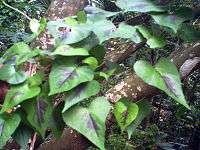Dasapushpam
Dasapushpam denotes Ten Sacred Flowers of Kerala (from Sanskrit Dasa = Ten and Pushpam = Flower). These ten herbs are traditionally significant to Keralites, the people of Kerala. These herbs are found almost everywhere in Kerala, especially in the western ghats region.[1] They are used for decorative purposes, such as making the floral carpet Pookalam during festivals (like Onam).[2]
List of Dasapushpam or Ten Sacred Flowers
The ten plants are:[1]
| Common Name | Binomial Name | Malayalam Name | Image |
|---|---|---|---|
| Slender dwarf morning-glory | Evolvulus alsinoides[3] | വിഷ്ണുക്രാന്തി (Vishnukranthi) | _in_Hyderabad_W_IMG_7978.jpg) |
| Indian doab or Bahama grass | Cynodon dactylon | കറുക (Karuka) |  |
| lilac tasselflower | Emilia sonchifolia | മുയൽ ചെവിയൻ (Muyal cheviyan) |  |
| Morning glory | Ipomoea sepiaria[4] | തിരുതാളി (Thiruthaali) |  |
| Mountain knotgrass | Aerva lanata | ചെറുള (cheroola) |  |
| Golden eye-grass | Curculigo orchioides | നിലപ്പന (Nilappana) |  |
| False daisy | Eclipta alba | കയ്യോന്നി(Kayyonni) |  |
| Little ironweed | Cyanthillium cinereum[5] | പൂവാംകുറുന്നില (Poovaamkurunnila) | |
| Biophytum sensitivum | Biophytum sensitivum | മുക്കുറ്റി (Mukkutti) | |
| Balloon plant | Cardiospermum halicacabum | ഉഴിഞ്ഞ (Uzhinja) |  |
Although these names refer to the flowers, the medicinal value lies in the leaves in most cases.
Ipomoea sepiaria
Extracts of Ipomoea sepiaria leaves feature antimicrobial activity. The extract was tested on bacteria including Staphylococcus aureus, Klebsiella pneumoniae, Escherichia coli and Pseudomonas aeruginosa.[6]
External links
- Photo Gallery of Dasapushpam
- More details about Dasapushpam in a website on Ayurveda.
References
- 1 2 K. Jiny Varghese, J. Anila, R. Nagalekshmi, S. Resiya and J. Sonu (2010). "Dasapushpam: The Traditional Uses And The Therapeutic Potential Of Ten Sacred Plants Of Kerala State In India" (PDF). International Journal of Pharmaceutical Sciences and Research 1 (10): 50–59.
- ↑ http://www.thehindu.com/todays-paper/tp-national/tp-kerala/athappookalam-losing-traditional-verve/article173569.ece
- ↑ evolvulus alsinoides
- ↑ Ipomoea sepiaria
- ↑ Cyanthillium cinereum
- ↑ Antimicrobial activity of Ipolmoea sepiaria
This article is issued from Wikipedia - version of the Wednesday, February 10, 2016. The text is available under the Creative Commons Attribution/Share Alike but additional terms may apply for the media files.
